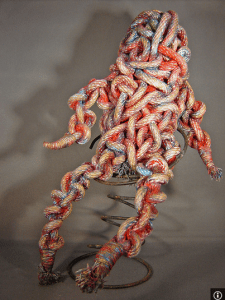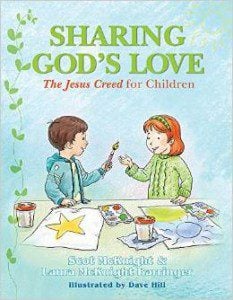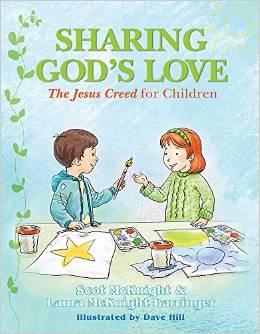 Zealotry is the choice to protect holiness by living beyond what the Bible says, and it finds in that zeal a source of immunity from being wrong.
Zealotry is the choice to protect holiness by living beyond what the Bible says, and it finds in that zeal a source of immunity from being wrong.
I contend that zealotry reflects an absence of trust in God’s Word.
Its motivation is the fear of freedom.
Its environment is inevitable: judgmentalism and boundary-marking that together destroy in different ways the unity in Christ. God’s people were not meant to be penguins, waddling all alike, but instead free, separable, unique individuals who live in community and fellowship across those differences.
I’ve never seen zealots who weren’t also judgmental; I’ve never seen those freed in the Spirit who were judgmental. The freed know the tranquility of where they belong in God’s society; zealots don’t know where they belong and therefore do not know that others also belong.
The freed love others and, in so loving others, care for their moral development; zealots seek to control others, and therefore do not love others properly. Zealots do not lead others into moral development but into conformity. They tie people into knots. [Image]
Zealots judge and sometimes condemn others who do not live by their rules, who explore things they are uncomfortable with — not because they’ve thought through it but because they don’t trust others to make good decisions. The freed, however, can live with the ambiguity that freedom in the Spirit creates: they can trust God to work with others, they can trust others to be responsible, and they can trust another group to discern its way in this world. The freed can render judgment as discernment, the zealots only judgment as condemnation. The freed can say “that’s not good, that’s not wise,” the zealot will say “you are bad.”
(By the way, and off the record, in this post — when we combine fences and judgmentalism — we’ve wandered into legalism. But that’s a different post.)
How far would Jesus have gotten if he had lived by the fences of zealotry? How much table fellowship with sinners would have ever taken place? None. Ever. He suffered the judgmentalisms of zealots but he pressed on anyway. Why? Because he knew that God made people to live in freedom in order to love God and to love others and that was the essence of what it meant to be a spiritual person. It was what the Torah was pointing to then and it was the Torah is pointing to now. This is what my Jesus Creed is all about.
Zealots who judge and build walls lose touch with the essence of the Torah, because they break trust with God and break down trust with others.
Jesus’ harshest demands were reserved for Pharisees who had learned to construct fences around the Torah and who rendered judgment on others by those fences. They thought their fences were protecting people from breaking Torah; Jesus thought their fences were (1) boundary marking and (2) preventing people from living in the freedom of God and (3) a failure to trust the sufficiency of Torah/Bible and (4) they were leading others astray. Matthew 23.
So, the fence makers inevitably end up judging others who don’t live by their fences, who jump their fences and who mess around with the Torah by living on the edge and by experimenting in God’s grace with how to live in a new day and a new way.
James blasts away at those who judge others; try reading James with this theme in mind.
Paul accuses the Galatians of tearing the body of Christ apart by constructing boundaries and by not living in the freedom of the Spirit.
John was willing to reduce God’s will to love God and to love one another. Read 1 John.
Zealots, however, would rather construct fences, build walls, and create boundaries. They fracture the Body of Christ and they deprive the community of followers from the freedom God has given us.
Zealotry is to construct rules beyond the Bible and, in so doing, to consider oneself immune from criticism because of radical commitment. What we have learned is that such a radical commitment is actually a fearful commitment rather than a life of freedom.
What are some examples?
We could give plenty. Let me hear from you some examples where (1) people add to the Bible and (2) create a sense of holy zealotry that leads to immunity and (3) leads people not to be or do what God wants us to be or do. Got some examples?
Sometimes there are real differences on interpretation of the Bible; sometimes genuine students disagree. Where there is genuine difference here, we might just as well admit that some “fences” are “legitimate”. I’m not really trying to address such instances, though everything I say below could be disputed by some. I’d rather that my examples be taken as legitimate examples and have us ponder (even if we might disagree slightly or more than that) the implications of what is being done.
Example: church attendance, church membership, and tithing. Are these things taught in the NT? Not directly. (Hear me out.)
The Torah on this one is Fellowship — regular and real and financial.
The Fences are that fellowship is truly expressed by attendance, membership, and tithing.
The Immunity is that by attending, by being members, and by tithing we are genuinely fellowshipping.
Judgment: Those who miss church are shallow; those who don’t “join” are not committed; those who don’t tithe are too materialistic.
Not so, I contend: You can attend, be members, and even tithe and not be committed in fellowship. When fellowship is where it all starts, the other elements fall into a natural place. When the other elements become the focus and the source of rendering judgments, fellowship can be lost or even missed altogether.
Repost.










